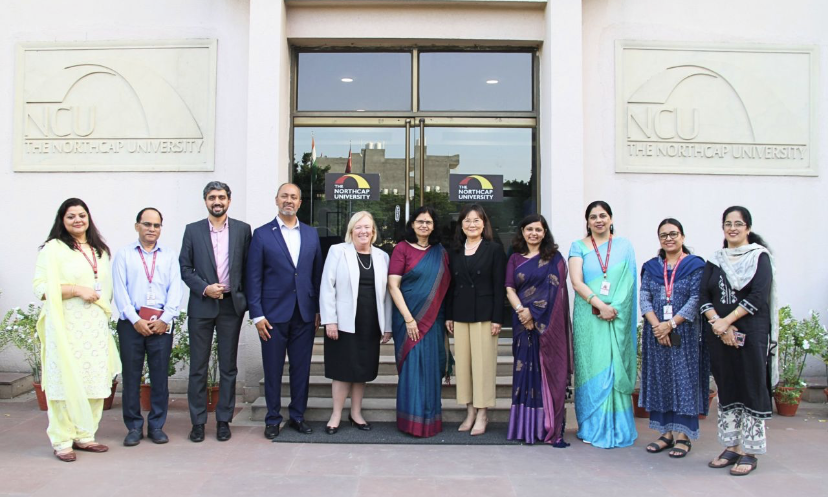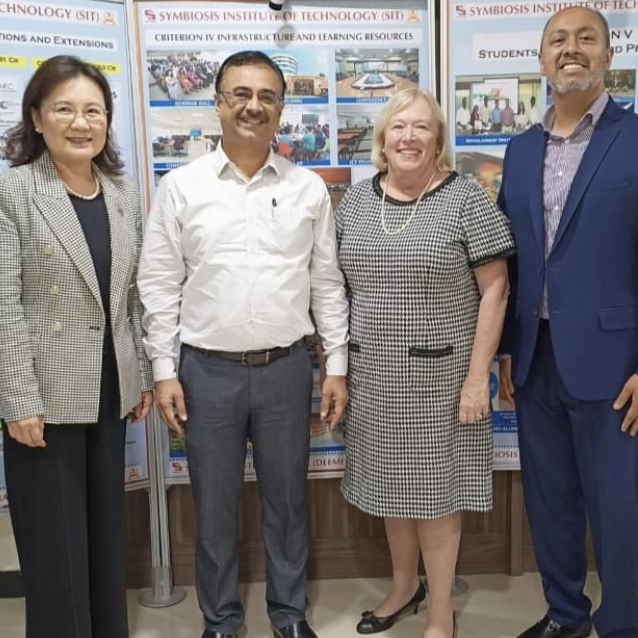
Loyola Marymount University recently sent a delegation of senior leadership to India for a weeklong trip focused on expanding LMU’s global partnerships and increasing enrollment in LMU’s science and engineering graduate programs.
“LMU is strategically positioned to be a valued partner to many Indian institutions,” said Ammar Dalal, Ed.D., assistant vice provost for Graduate Enrollment. “Especially in areas of STEM graduate education.” Dalal, joined by Vice Provost Maureen Weatherall, Ed.D., for Enrollment Management, and Dean Tina Choe Ph.D., of LMU Frank R. Seaver College of Science and Engineering, visited 11 colleges and universities in four major Indian cities – Mumbai, Pune, Ahmedabad, and Delhi. During their visits, the delegation met with institutional administrators, interacted with program department heads and faculty, and hosted student interest sessions.

The country recently embarked on an ambitious 20-year initiative to revitalize its education system. The National Education Policy (NEP), launched in 2020, advances India’s rich heritage of pursuing knowledge, wisdom, and truth with a 21st century focus. It aims to transform the prevailing model of single-discipline institutions into multidisciplinary institutions that allow students to explore diverse subjects, build their critical thinking, creative, and problem-solving skills, and shape well-rounded graduates who can excel in any professional environment.
A presentation led by Choe illustrated how graduate engineering programs in Seaver College, where science and engineering disciplines are housed, emphasize interdisciplinary learning throughout the curriculum. Seaver faculty’s applied-research learning approach prepares graduates to excel as pioneers, innovators, and leaders in all STEM fields. LMU’s location in the heart of Silicon Beach and its proximity to the booming aerospace industry creates unparalleled access to future employment opportunities for our graduate students.
Throughout the trip, the LMU delegation met with top-ranked institutions in India, including engineering colleges and universities ranked in the top 35 among 1,000+ institutions. “We met excellent leaders and faculty at these institutions, motivated to create new partnerships including joint research and degree programs with the Seaver College of Science and Engineering,” said Choe. “I am excited to build upon our first visit to create meaningful collaborations moving forward,” Additional areas of mutual interest were identified, including student and faculty exchanges, joint seminars and workshops, and summer programs. Advanced discussions with stakeholders at these institutions are ongoing with new partnerships to be announced soon.
“India’s population is the largest and youngest in the world, and their universities are at the early stages of collaboration and partnerships,” said Weatherall. “LMU is well positioned to be a part of that. With one the largest populations of Jesuit priests and a significant Jesuit educational presence, there is strong recognition of the value of an LMU education and a deep interest in exploring opportunities to work together. As we look to ‘ignite a brighter world,’ Indian institutions will be strong mission-centric global partners.”
Weatherall also met with Indo-American Chamber of Commerce representatives in Ahmedabad, where they discussed the evolving education landscape in India and the United States and the opportunities it opens for universities and businesses. Artificial intelligence, and its impact on global business practices, was also an important topic of conversation. The group further discussed the need to ensure students graduate prepared for the new careers that will develop due to this fast-growing technology.
In alignment with LMU’s strategic plan of extending its reach beyond the bluff and Seaver College’s goal to deepen global commitments, engagement in India is expected to continue for the foreseeable future.



